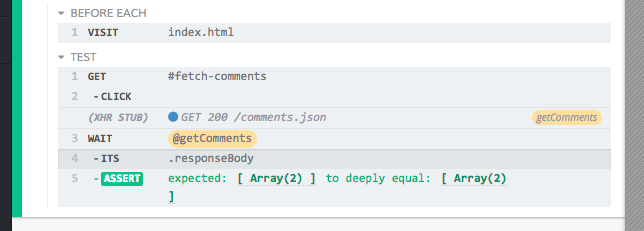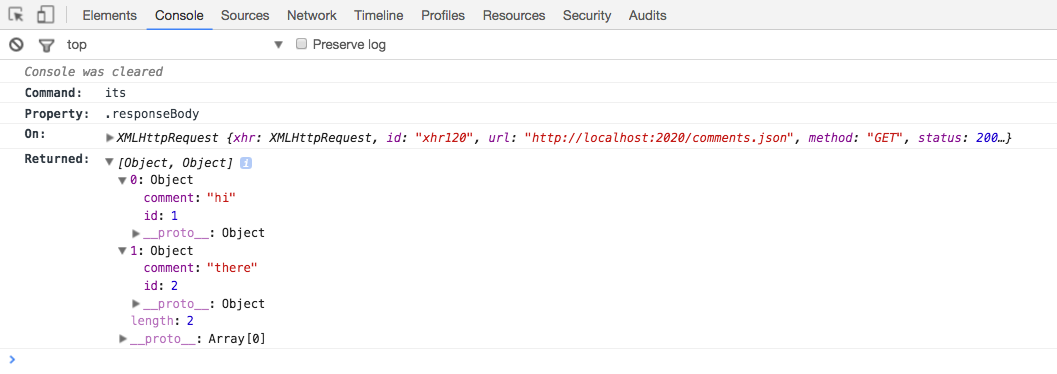its
Get a property's value on the previously yielded subject.
info
If you want to call a function on the previously yielded subject, use
.invoke().
Syntax
.its(propertyName)
.its(propertyName, options)
Usage
Correct Usage
cy.wrap({ width: '50' }).its('width') // Get the 'width' property
cy.window().its('sessionStorage') // Get the 'sessionStorage' property
Incorrect Usage
cy.its('window') // Errors, cannot be chained off 'cy'
cy.clearCookies().its('length') // Errors, 'clearCookies' does not yield Object
Arguments
propertyName (String, Number)
Index, name of property or name of nested properties (with dot notation) to get.
options (Object)
Pass in an options object to change the default behavior of .its().
| Option | Default | Description |
|---|---|---|
log | true | Displays the command in the Command log |
timeout | defaultCommandTimeout | Time to wait for .its() to resolve before timing out |
Yields
.its()'yields the value of the property..its()is a query, and it is safe to chain further commands.
Examples
Objects
Get property
cy.wrap({ age: 52 }).its('age').should('eq', 52) // true
Arrays
Get index
cy.wrap(['Wai Yan', 'Yu']).its(1).should('eq', 'Yu') // true
DOM Elements
Get the length property of a DOM element
cy.get('ul li') // this yields us a jquery object
.its('length') // calls 'length' property returning that value
.should('be.gt', 2) // ensure the length is greater than 2
Requests
Get the user object of the response's body
cy
.request(...)
.its('body.user')
.then(user => ...)
alternatively, use destructuring
cy
.request(...)
.its('body')
.then(({user}) => ...)
Strings
Get length of title
cy.title().its('length').should('eq', 24)
Functions
Get function as property
const fn = () => {
return 42
}
cy.wrap({ getNum: fn }).its('getNum').should('be.a', 'function')
Access function properties
You can access functions to then drill into their own properties instead of invoking them.
// Your app code
// a basic Factory constructor
const Factory = (arg) => {
// ...
}
Factory.create = (arg) => {
return new Factory(arg)
}
// assign it to the window
window.Factory = Factory
cy.window() // yields window object
.its('Factory') // yields Factory function
.invoke('create', 'arg') // now invoke properties on it
Use .its() to test window.fetch
Nested Properties
You can drill into nested properties by using dot notation.
const user = {
contacts: {
work: {
name: 'Kamil',
},
},
}
cy.wrap(user).its('contacts.work.name').should('eq', 'Kamil') // true
Existence
Wait for some property to exist on window
cy.window()
.its('globalProp')
.then((globalProp) => {
// do something now that window.globalProp exists
})
Assert that a property does not exist on window
cy.window().its('evilProp').should('not.exist')
Rules
Requirements
.its()requires being chained off a previous command.
Assertions
.its()will automatically retry until it has a property that is notnullorundefined.
Timeouts
.its()can time out waiting for the property to exist..its()can time out waiting for assertions you've added to pass.
Command Log
Get responseBody of aliased route
cy.intercept('/comments', { fixture: 'comments.json' }).as('getComments')
cy.get('#fetch-comments').click()
cy.wait('@getComments')
.its('response.body')
.should(
'deep.eq',
JSON.stringify([
{ id: 1, comment: 'hi' },
{ id: 2, comment: 'there' },
])
)
The commands above will display in the Command Log as:

When clicking on its within the command log, the console outputs the
following:

History
| Version | Changes |
|---|---|
| 3.8.0 | Added support for options argument |
| 3.7.0 | Added support for arguments of type Number for propertyName |